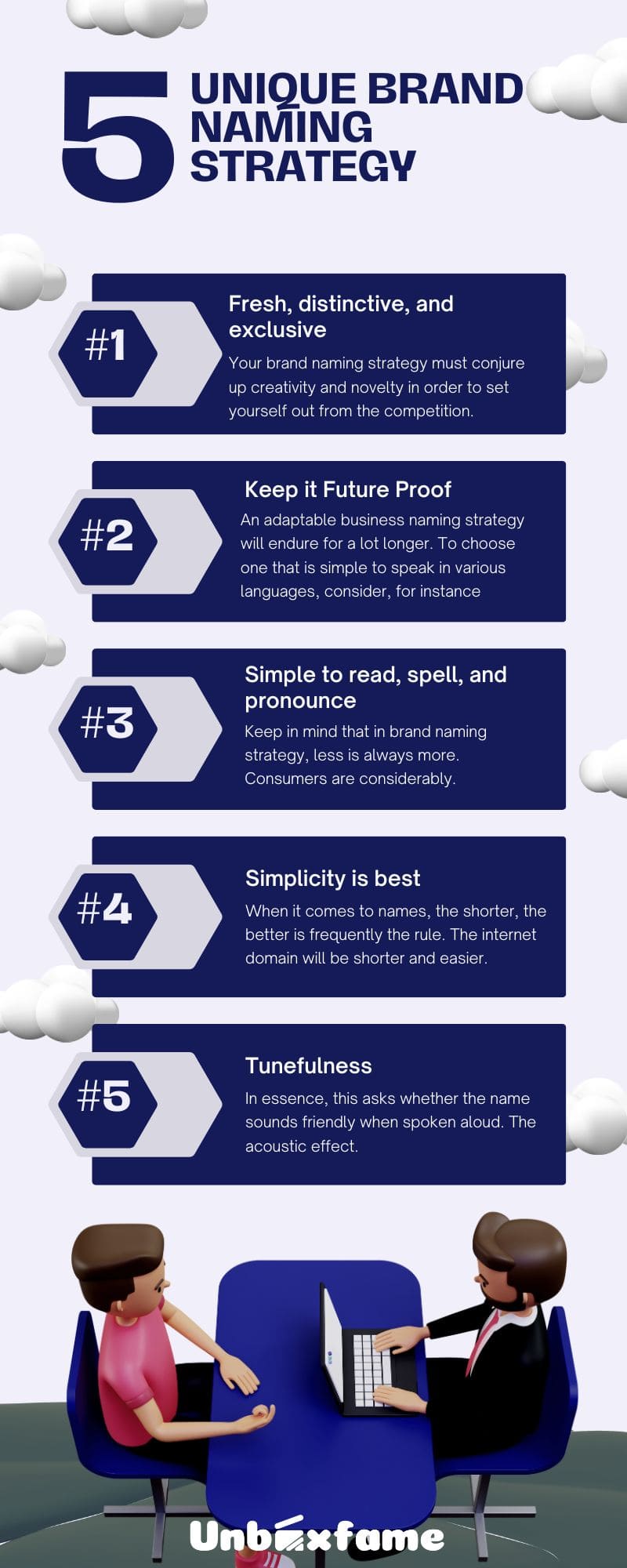It’s common to understand how important a brand name is to its identification. A correctly crafted name can set a company apart from competitors, evoke emotions, and communicate the firm’s principles and personality. The process of developing a brand name is guided by a best brand naming strategy, which ensures the name fits the brand’s personality, target market, and business goals. In this article, we’ll look at the essential elements of a Brand Naming, Business Naming & Product naming Architecture and how to develop one in 2023.
What is Naming a Brand?
In marketing, the phrase “naming” is frequently used to describe the process of creating a brand name while considering its goods and services.
Every unique company naming strategy must go through this process, which is crucial for formulating a company’s marketing and advertising plans. Along with the naming, a distinct corporate identity aligns with the project’s values and characteristics.
Given that a brand’s name will be the first thing customers will encounter, we advise keeping it simple, memorable, and, most importantly, easy to pronounce.
The Importance of Having a Good Company (Business) Naming Strategy
When you first start out, naming your business might not seem like a top priority. However, it’s essential for both new businesses and well-established brands that are undergoing a rebrand to have a company naming strategy. A company naming strategy is equally as crucial in determining how your brand is viewed and communicated to your customers, although being distinct from a brand strategy.
Making decisions about things like whether you want an Invented Brand Names or descriptive brand name and how distinctive you can make it without alienating your audience are all part of the strategy behind naming a firm. A corporate naming strategy can assist in transforming your brand from forgettable to memorable by answering your customer’s questions.
The advantages of having a business naming strategy and a brand naming framework are similar. It may set your company apart from the competition, help you choose your target market and marketing plan, provide consistent messaging, and provide consistency across all brand touchpoints. Overall, developing a solid brand visual identity requires careful consideration of your company’s naming strategy.
How to Develop a Good Brand Naming Strategy?
Usually, it takes more than a few hours to find a good business name for your company. Usually, it takes more than a few hours to find a good name for your company. Finding a good brand naming strategy for your company typically takes longer than a few hours. In actuality, it is a time-consuming process that requires adhering to a number of crucial steps.
1. Patience is the Way Forward
To select the company naming strategy, take your time. A lot of patience, imagination, and time you need to put before having the feeling of Eureka.
2. Begin With the Fundamentals
Start with the basics when coming up with a name for your business or your product: Clearly state what your expectations are. Clarity on the product or service, how it works, and who it is for is crucial because the naming must accurately express it.
3. Make a List of Ideas
The most important step in the product naming strategy is to list every name you can think of while taking into account the data that has already been gathered.
Please spend some time on it, solicit input from others, and never dismiss a notion too quickly. The more options available now, the better!
4. The Last Suggestion
It’s crucial to go through the complete list and see which names have already been registered by other brands before falling in love with any particular one. During such cases, naturally, these suggestions need to discard right away. It’s always crucial to confirm that associated web domains to your preferred name are accessible.

Things to Consider When Choosing a Unique Brand Naming Strategy
1. Fresh, Distinctive, and Exclusive
Your brand naming strategy must conjure up creativity and novelty in order to set yourself out from the competition and draw customers in. Give new, distinctive, and unique ideas precedence.
2. Keep it Future Proof
An adaptable business naming strategy will endure for a lot longer. To choose one that is simple to speak in various languages, consider, for instance, whether you intend to expand to other nations. Or, for example, if your business diversifies and it holds true for different industries.
3. Simple to Read, Spell, and Pronounce
Keep in mind that in brand naming strategy, less is always more. Consumers are considerably more likely to recall simple names that are simple to say, read, and write.
4. Simplicity Is Best
When it comes to names, the shorter, the better is frequently the rule. The popular domain Name extensions will be shorter and easier to remember, which will also make it simpler to place. This also means that character limits won’t be an issue in social networks.
5. Intriguing and Suggestive
What do you want people to know about you? We advise using a provocative and evocative brand name because associations with concepts are more robust, significant, and easier to remember.
6. Try to use Positive Words
Avoid giving your product naming strategy any unfavorable connotations. In order to prevent mistakes or unintended connotations, it is crucial to find out if it has a meaning in any other language.
7. Tunefulness
In essence, this asks whether the name sounds friendly when spoken aloud. The acoustic effect is crucial since certain brands produce a louder sound than others when spoken. Some alphabets provide a pleasing auditory impact, unlike the other alphabets.
How Can a Brand Name Inspire Feelings?
Brand names can be practical triggers for consumers’ emotions.
Here are some 5 brand name strategies to elicit feelings:
1. Use Intriguing Language
Select words that convey specific emotions or feelings, such as “adventure,” “love,” “hope,” “trust,” or “innovation.”
2. Create a Narrative or Backstory
Create a brand name that stirs up feelings in the audience. This might be something as straightforward as the brand’s history or the source of the name.
3. Use Metaphor or Symbolism
Incorporate metaphors or symbols that express a specific emotion or sensation into the name of your company. For instance, the name “Dove” connotes purity, love, and harmony.
4. Utilize the Symbolism of Sound
Various sounds can elicit different emotions or feelings. Words with the “oo” sound, like “smooth” or “cool,” for instance, can generate feelings of consolation or relaxation.
5. Use Cultural Allusions
Include cultural allusions in your brand name that conjure feelings or emotions unique to that culture. For instance, the name “Nike” is derived from the Greek goddess of victory, connoting prosperity and triumph.
Remember that building an emotional bond with customers necessitates consistency and genuineness. Make sure that every aspect of your brand—from your logo to your messaging to your customer service—reflects the feelings you want to evoke with your brand name strategy.
How Do Unique Brand Naming Strategies Vary Depending on The Niche?
Depending on several variables like the target market, brand positioning, and the competitive environment, product naming strategies can vary from niche to niche. Here are a few illustrations:
1. Business-to-Business (B2B) vs. Business-to-Consumer (B2C)
A brand name strategy for a B2B product or service may focus more on professionalism, competence, and industry-specific vocabulary. In contrast, a B2C brand may attempt to be more relatable, dynamic, and attention-grabbing.
2. Vocabulary Specific to The Industry
Some niches, like healthcare or finance, may contain vocabulary particular to the field that can be used in the brand name to convey knowledge and authority.
3. Culture-Specific Factors
Particularly in global marketplaces, business name may need to consider cultural conventions and values in various niches. For instance, a brand name that resonates in one culture might not do so in another.
4. Competitive Environment
A niche’s level of market competition might affect a brand’s naming approach. A brand name that stands out and is simple to recall may be more crucial in a crowded market than in one with few competitors.
5. Product or Service Features
A brand’s naming strategy can also result in the product or service’s features. On the other hand, a company name for an eco-friendly product might emphasize sustainability and environmental responsibility. As an illustration, a brand name for a luxury product might emphasize exclusivity and refinement.
It’s crucial to take into account the distinctive qualities of the niche when choosing a brand name because a brand naming strategy may vary from niche to niche depending on a variety of criteria.
Unboxfame: Your One-Stop Shop for a Unique Brand Name Strategy
Unboxfame is a unique product naming company that differentiates apart from the competition. They have helped name and build many corporations, start-ups, and non-profits thanks to their years of experience in the field. They know that while some companies choose the perfect name by chance, many others fight for months to find the right one. Most business owners lack the creativity and technical knowledge to create a brand name strategy.
Working with Unboxfame guarantees significantly reduced stress and the work of creating an internal naming program. As a brand naming agency, we offer more original, relevant, and targeted naming frameworks for your company. Unboxfame, as opposed to generalist creative firms, specializes in brand naming strategy, making them the go-to company for developing an informed naming strategy that considers naming structure, framework, and hierarchy.
In publishing and graphic design, Lorem ipsum is a placeholder text commonly used to demonstrate the visual form of a document or a typeface without relying on meaningful content.
